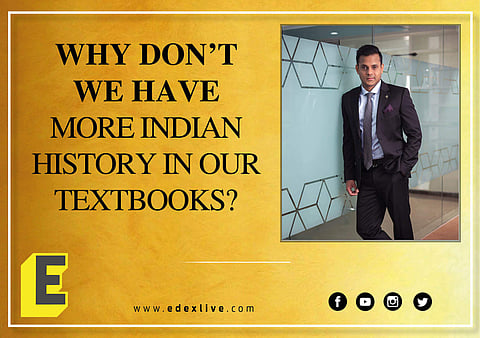

History buff. Producer. Freethinker. Proud Maratha. There are a lot of ways to describe Rohit Shelatkar, but perhaps where he is at his most insightful is when he is talking about history — specifically the gloriously grandiose stories of several Maratha kings and warriors. "When you talk of Indian history, there is very little talk of the Maratha empire," he tells me vehemently over a chat from the UK, where he serves as Director of Vitabiotics, which makes nutrition supplements for people of all ages.
Hang on, history and health supplements? Well, he's also the guy who co-produced Ashutosh Gowariker's Panipat that starred Arjun Kapoor and Sanjay Dutt — a period flick about the valour of Sadashiv Rao that ought to have made him a mainstay in most Indian history textbooks. "We like to study other people's histories but not our own," he says dourly before adding, "If we take any textbook in the Maharashtra board, you'll find a lot about how the queens were dressed but very little about Shivaji's army or about what happened after him." Tragic, that.
And that's why Rohit believes that our textbooks, especially with a new curriculum around the corner following the New Education Policy itself, need a desi revamp. "Infusion of good history and consultations with the top historians in the country is needed. We have a wealth of knowledge and our historians are fortunately still alive and the sooner we tap into that the better, because these learned people will go one day. It's best to preserve that knowledge."
Knowledge is a curious thing. Very often we know that our conventional knowledge systems (call them grandma's tales even) prescribe dietary and medicinal rigours that the heart doesn't quite love. And that's something that has been badly exposed during the pandemic, "There can never be any positive about a pandemic that has killed millions, but what it has done is given us all time to sit back and think about our health. How important it is to eat homemade food, do your own cleaning and laundry and so on," says Rohit, while adding that we're about "twenty years" past the due date when almost everyone has to pop pills on a daily basis to keep going.
Rohit Shelatkar is Director of Vitabiotics
Pessimistic much? Not entirely. "But it's never late, we can still turn things around," he says with a note of optimism steering the conversation to how we need to look back in time with regard to our diets, "In our ancient civilisations, we have had traditional medicines and ways of eating that we have messed up with western food. Intermittent fasting, which is the latest trend in losing weight, has always been a part of Indian culture. People find it easy to eat a burger when compared to having a banana. If you're hungry and don't want to eat an apple or a banana, then I don't think you're hungry at all."
Hunger, of course, is a very real and present danger in India. Not in the reasonably urban circles most of us have the privilege of living in, but in the heartland — where our very food, the source of our existence comes from. And yet, the very farmer whose toil leads to food on our plates is often driven to suicide and his family to a life of repayment. Which is why Rohit set up the Grand Maratha Foundation to help educate the families of farmers who had taken the extreme step, "When I started reading about farmer suicides, I would wonder — Why are farmers dying? — The answer is because he does not have enough to feed his family. Can you imagine that happening anywhere else in the world?" he asks.
As we uncomfortably ponder the answer to that, he continues, "When you are born, the first person who feeds you is your mother and it is the farmer. If you have any respect for him, you cannot let even one farmer die. You can make a difference as an individual, not only think that the government needs to do something."
Baby steps can save lives too.
